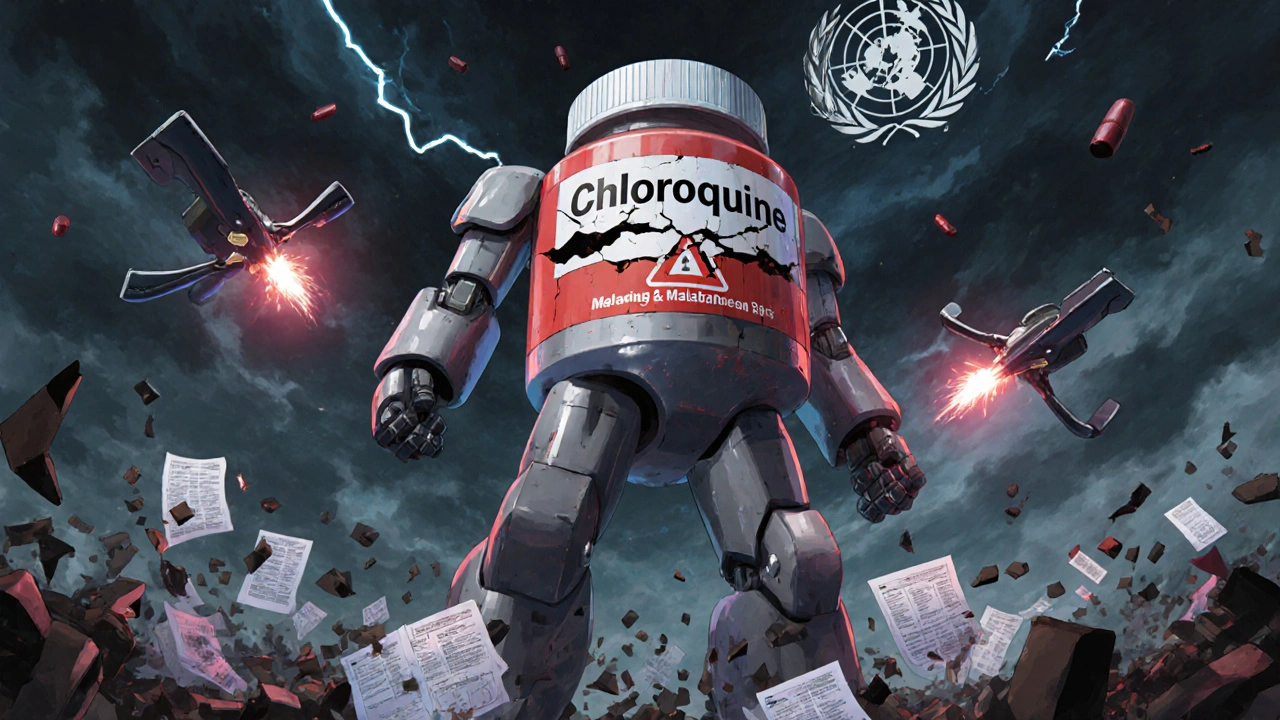
Malaria and Autoimmune Treatment Comparison Tool
Choose a condition from the dropdown above to see modern treatment alternatives
Chloroquine was once a go-to drug for malaria and even got sudden attention during the early days of the pandemic. But here’s the truth: Chloroquine isn’t the miracle cure it was sold as, and its use today is tightly restricted. If you’re looking at chloroquine because you heard it might help with something - whether it’s malaria, autoimmune disease, or something else - you need to know what alternatives actually work, and why some options are off the table.
What Chloroquine Actually Does
Chloroquine is an antimalarial drug developed in the 1930s. It works by interfering with how malaria parasites digest hemoglobin inside red blood cells. For decades, it was cheap, effective, and widely used in places like sub-Saharan Africa and Southeast Asia. But over time, malaria parasites evolved. By 2020, over 90% of Plasmodium falciparum - the deadliest malaria strain - was resistant to chloroquine in most parts of the world.
Outside of malaria, chloroquine and its close cousin hydroxychloroquine were used for autoimmune conditions like lupus and rheumatoid arthritis. They help calm the immune system’s overreaction. But even here, they’re not first-line anymore. Doctors now prefer drugs with better safety profiles and proven long-term results.
Why Chloroquine Is Risky
Chloroquine isn’t harmless. It can cause serious heart problems, especially at higher doses. The most dangerous risk is QT prolongation - a change in the heart’s electrical rhythm that can lead to sudden cardiac arrest. This isn’t theoretical. In 2020, the FDA revoked its emergency use authorization for chloroquine in COVID-19 after multiple reports of fatal heart arrhythmias. A study in The Lancet that same year found patients on chloroquine for COVID had a 34% higher risk of death compared to those who didn’t take it.
Other side effects include blurred vision (which can become permanent), low blood sugar, and nerve damage. It also interacts badly with dozens of common medications, including antibiotics, antidepressants, and even some heart drugs. Taking chloroquine without medical supervision is dangerous - and in many countries, it’s now illegal to buy it over the counter.
Alternatives for Malaria
If you’re traveling to a malaria-endemic region, chloroquine is no longer the answer. Here’s what doctors recommend today:
- Atovaquone-proguanil (Malarone): Taken daily, starts working within hours, and has fewer side effects. Used in Africa, Southeast Asia, and South America. Cost: around $50 for a 14-day course.
- Doxycycline: A broad-spectrum antibiotic that also blocks malaria. Cheaper than Malarone, but causes sun sensitivity and isn’t safe for kids under 8 or pregnant women.
- Artemisinin-based combination therapies (ACTs): The gold standard for treating active malaria infections. Drugs like artemether-lumefantrine kill parasites fast and are effective even against resistant strains. WHO recommends these as first-line treatment globally.
- Primaquine: Used to prevent relapses from Plasmodium vivax, which can hide in the liver. Requires a G6PD test first - people with this genetic condition can have severe anemia if they take it.
These aren’t just alternatives - they’re better. They work faster, have fewer side effects, and are less likely to fail due to resistance.

Alternatives for Autoimmune Diseases
If you’re using chloroquine for lupus or rheumatoid arthritis, you’re likely on an outdated plan. Modern treatments are more targeted and safer:
- Hydroxychloroquine: Often confused with chloroquine, this is a slightly modified version with less toxicity. Still used sometimes, but even here, doctors are moving away. It’s not risk-free - retinal damage is still possible after years of use.
- Methotrexate: The most common first-line drug for rheumatoid arthritis. Taken weekly, it slows joint damage and reduces inflammation. Side effects include nausea and liver stress, but regular blood tests catch problems early.
- Biologics (like adalimumab, etanercept): These are injectable drugs that target specific immune system proteins. They’re expensive - up to $20,000 a year - but work wonders for people who don’t respond to older drugs.
- Belimumab: The only FDA-approved drug specifically for lupus. It targets B-cells that drive the disease. Given as an IV infusion every two weeks.
Hydroxychloroquine is still used in some cases, but only after other options are tried. And even then, patients get regular eye exams to watch for retinal damage.
What About Ivermectin or Remdesivir?
You’ve probably heard about ivermectin or remdesivir as "alternatives" to chloroquine - especially for viral infections. But here’s the reality:
- Ivermectin: An antiparasitic drug used for river blindness and scabies. It has zero proven benefit for COVID-19, malaria, or any viral illness in humans at safe doses. Studies claiming otherwise were flawed or retracted. Taking it for viruses can cause dizziness, vomiting, and even neurological damage.
- Remdesivir: An antiviral approved for hospitalized COVID-19 patients. It shortens recovery time by about 5 days - but doesn’t reduce death rates. It’s given intravenously in hospitals. It’s not a substitute for chloroquine, and it’s not used for malaria or autoimmune conditions.
These drugs aren’t interchangeable. They work on completely different targets. Mixing them up based on internet rumors can be harmful.
When Is Chloroquine Still Used?
There are very few cases left where chloroquine is the right choice:
- Some rare strains of Plasmodium vivax in parts of Central America and the Middle East still respond to it.
- Very limited use in certain autoimmune cases where no other drug works - and even then, only under strict monitoring.
Outside of those, it’s obsolete. The World Health Organization stopped recommending chloroquine for malaria prevention in 2012. The CDC says it’s no longer effective in most regions.

What You Should Do Instead
If you’re considering chloroquine:
- Don’t buy it online. Many websites sell fake or contaminated versions.
- Don’t self-medicate. Even if you have a prescription, don’t adjust the dose without talking to your doctor.
- Ask for alternatives. If you’re on chloroquine for malaria or lupus, ask your doctor: "Is there a safer, more effective option?"
- Get tested. If you’re using it for malaria prevention, make sure you know which strain is common in your travel destination - resistance maps change every year.
There’s no shame in switching to a better drug. Medicine has moved on. Sticking with chloroquine because "it worked before" is like using a 1990s phone because it still turns on. It might function - but you’re missing out on safety, speed, and effectiveness.
Final Thoughts
Chloroquine isn’t evil. It saved millions of lives in the 20th century. But science doesn’t stand still. What worked in 1950 doesn’t work in 2025. The alternatives are not just options - they’re improvements. They’re safer, more reliable, and backed by real data.
If you’re still considering chloroquine, ask yourself: Why? Is it because you heard a story online? Because it’s cheap? Because a friend took it? Those aren’t medical reasons. Talk to a real doctor. Get tested. Get the right drug for the right condition.
Is chloroquine still used for malaria today?
Rarely. Most malaria strains worldwide are now resistant to chloroquine. The WHO and CDC no longer recommend it for prevention or treatment in most regions. Alternatives like artemisinin-based combination therapies (ACTs), atovaquone-proguanil, and doxycycline are far more effective.
Can I buy chloroquine over the counter?
No. In Australia, the U.S., the UK, and most other countries, chloroquine is a prescription-only drug. Online sellers offering it without a prescription are selling counterfeit or unregulated products - many contain dangerous fillers or incorrect doses.
Is hydroxychloroquine safer than chloroquine?
Yes, hydroxychloroquine is generally less toxic than chloroquine and is still used occasionally for lupus and rheumatoid arthritis. But it still carries risks - especially retinal damage with long-term use. Regular eye exams are required, and it’s no longer a first-line treatment.
Why was chloroquine promoted for COVID-19?
Early in the pandemic, small, poorly designed studies suggested it might help. These were later debunked. Large, peer-reviewed trials showed no benefit and increased risk of heart problems. The FDA revoked its emergency use authorization in June 2020 after clear evidence of harm.
What should I take instead of chloroquine for lupus?
Methotrexate is the most common first-line treatment. For more severe cases, biologics like adalimumab or belimumab are used. These drugs target specific parts of the immune system and have better long-term safety than chloroquine or hydroxychloroquine.
Are there natural alternatives to chloroquine?
No. There are no proven natural remedies that replace chloroquine for malaria or autoimmune diseases. Supplements like turmeric or zinc don’t block malaria parasites or calm autoimmune responses the way prescription drugs do. Relying on them instead of real medicine can be life-threatening.
Next Steps
If you’re currently taking chloroquine, schedule a check-up. Ask your doctor to review your condition and whether you should switch to a modern alternative. If you’re considering it for travel, talk to a travel clinic - they’ll give you up-to-date advice based on your destination. If you’re researching for someone else, share this info. Don’t let outdated myths put lives at risk.

prajesh kumar
October 29, 2025 AT 13:05Really glad someone laid this out clearly. I’ve seen so many people online still pushing chloroquine like it’s magic dust. Medicine evolves - and that’s a good thing. We should celebrate better options, not cling to old myths.
Arpit Sinojia
October 30, 2025 AT 23:45My uncle in Kerala still swears by chloroquine for fever. Told him about ACTs last monsoon - he said, 'But it’s cheaper.' I just handed him a pamphlet from the local health center. Sometimes education needs to be simple.
Kshitiz Dhakal
November 1, 2025 AT 00:58Chloroquine was the opiate of the masses in the 20th century - a placebo wrapped in scientific authority. Now we have precision medicine. The irony? The same people who rejected chloroquine for COVID now crave 'natural' alternatives. Progress is just another word for discomfort.
kris tanev
November 2, 2025 AT 21:20OMG YES. I had a friend take ivermectin for 'COVID prevention' and ended up in the ER with dizziness and vomiting. Like bro… it’s for worms. Not viruses. We need better science communication. Also, Malarone saved my butt in Thailand - no regrets, even if it cost a fortune.
Mer Amour
November 4, 2025 AT 05:19People don’t understand that drugs aren’t interchangeable like Netflix shows. Chloroquine, ivermectin, remdesivir - different mechanisms, different purposes. Taking one because you saw a YouTube video is like using a hammer to change a lightbulb. You’re not just wrong - you’re dangerous.
peter richardson
November 4, 2025 AT 17:09Chloroquine is obsolete. Period. Anyone still using it for malaria is either ignorant or reckless. And the fact that people still believe in 'natural cures' for lupus? That’s not just stupid - it’s criminal. Stop trusting influencers. Trust data.
Uttam Patel
November 6, 2025 AT 10:18So let me get this straight… you’re telling me the drug that was once sold like soda is now a felony to buy without a prescription? And we’re supposed to be grateful? Cool. I’ll just take my turmeric and my faith.
Kirk Elifson
November 8, 2025 AT 06:43Western medicine thinks it’s so smart now. But what about tradition? What about culture? In my family, we’ve used herbal remedies for generations. Now you want us to trust a $20,000 injection from Big Pharma? No thanks. I’ll stick with what worked for my grandfather.
Nolan Kiser
November 8, 2025 AT 10:26Let’s be real - the biggest problem isn’t chloroquine. It’s the misinformation ecosystem. People don’t read studies. They read headlines. And then they share them. That’s why we need more doctors on Reddit, more clear infographics, more accessible science. Not just ranting. Teaching.
Prema Amrita
November 10, 2025 AT 09:57Hydroxychloroquine for lupus still has a place - but only with strict monitoring. I’ve seen retinal damage from long-term use. Regular eye exams aren’t optional. If your doctor isn’t scheduling them, find a new one. Your vision matters more than your pride in sticking with an old prescription.
Robert Burruss
November 11, 2025 AT 09:47There’s something poetic about how medicine outgrows its heroes. Chloroquine saved millions - but its legacy isn’t in its efficacy anymore. It’s in the lesson: that all authority, even scientific authority, must be questioned, tested, and replaced when better tools emerge. We mourn not the drug, but our own resistance to change.
Alex Rose
November 12, 2025 AT 01:05ACTs are the gold standard. Full stop. But the real issue is access. In rural India, Malarone is unaffordable. Doxycycline is the pragmatic choice. So while the science is clear, the implementation isn’t. Stop treating this like a textbook problem - it’s a socioeconomic one.